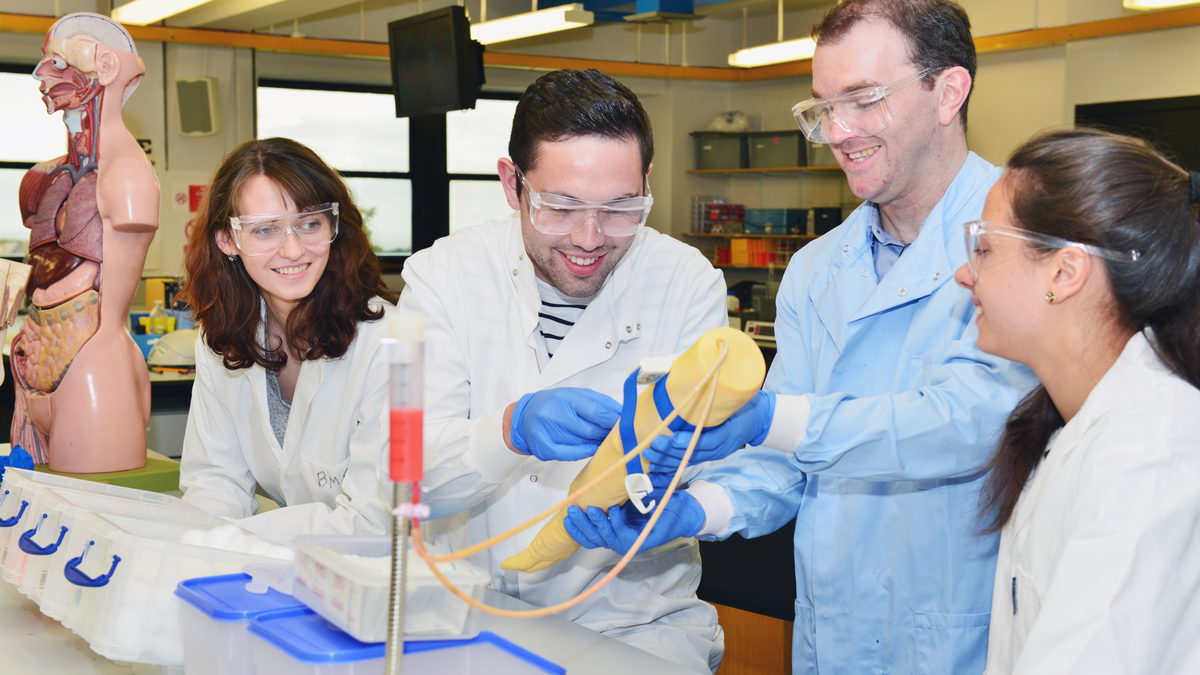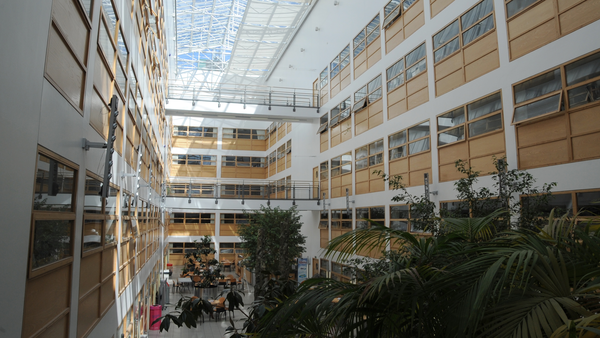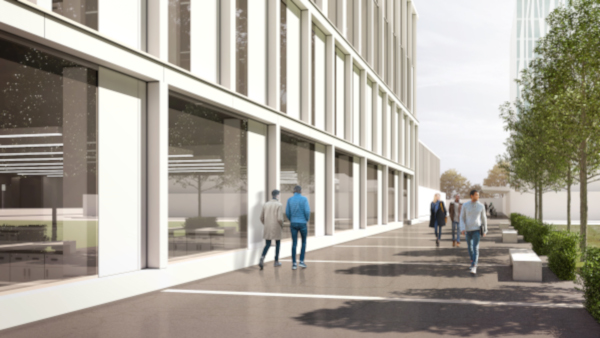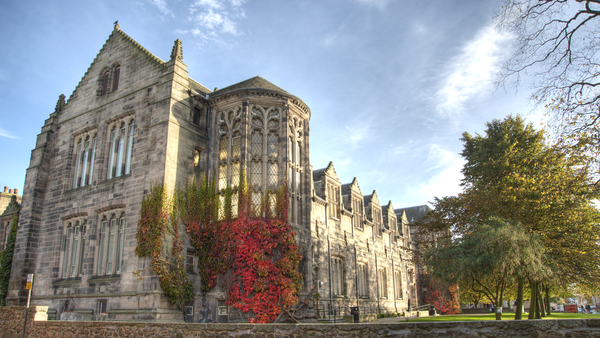Introduction
The primary goal of Biomedical Science is to enhance understanding of human body function in health and disease.
We are ranked 1st in the UK for Anatomy and Physiology in The Times & Sunday Times Good University Guide 2024.
Study Information
At a Glance
- Learning Mode
- On Campus Learning
- Degree Qualification
- BSc
- Duration
- 48 months
- Study Mode
- Full Time
- Start Month
- September
- UCAS Code
- B9BC
- Pathway Programme Available
- Undergraduate Foundation Programme

In the first two years of your degree, you will gain a broad knowledge of subjects related to medical science and in scientific research methods. In addition, you will enhance your critical analysis abilities while developing your interpersonal skills through team-working and oral/written communications.
Advanced knowledge of anatomy will be acquired in the third and fourth years of the programme. The University of Aberdeen boasts a state of the art anatomy facility, housed in the Suttie Centre on the Foresterhill Health Campus. In addition to traditional learning, using cadaveric material, we are proud to house a state of the art 3D anatomy learning resource, allowing the integration of 3D virtual anatomy into lectures and other teaching scenarios.
5 year MSci degree
There is also the opportunity to complement this degree by undertaking a year's placement in an industrial, commercial or research environment and therefore graduating after five years with an MSci (an undergraduate Masters degree) instead of a BSc. Find out more.
What You'll Study
- Year 1
-
In year 1, you will take a mix of compulsory courses and courses of your choosing to gain a total of 120 credit points.
These courses will provide a general background in Medical Science, preparing you for the more detailed studies of human physiology that will be made in the second year of study.
Compulsory Courses
- Getting Started at the University of Aberdeen (PD1002)
-
This course, which is prescribed for level 1 undergraduate students (and articulating students who are in their first year at the University), is studied entirely online, takes approximately 5-6 hours to complete and can be taken in one sitting, or spread across a number of weeks.
Topics include orientation overview, equality and diversity, health, safety and cyber security and how to make the most of your time at university in relation to careers and employability.
Successful completion of this course will be recorded on your Enhanced Transcript as ‘Achieved’.
- Chemistry for the Life Sciences 1 (CM1020)
-
15 Credit Points
This course covers the foundations of chemistry that underpin the life sciences at a molecular level and is suitable for students with different backgrounds including little or no previous study of chemistry. The basic concepts of quantitative chemistry will be covered, along with the different types of organic molecules, acids and bases, and the principles of kinetics and thermodynamics. The relevance of the course materials to life science is emphasised throughout.
Laboratory classes introduce important practical techniques, with experiments that reinforce and complement the taught material.
The course will allow students to continue with other chemistry courses as part of their enhanced study by providing discipline breadth.
- Introduction to Medical Sciences (SM1001)
-
15 Credit Points
- Topics covered in this course span medical science through the ages; from ancient civilizations to the modern day science of genomics and synthetic biology.
- Alongside lecture material, in depth practical classes will cover biomedical measurement techniques, forensic science and a research-based mini project.
- Overall, this course is a journey through some of the key milestones that underpin the discipline of medical science we see today.
- Chemistry for the Life Sciences 2 (CM1512)
-
15 Credit Points
Chemistry plays a vital role in the life sciences, explaining the properties of biomolecules and how biological processes work at a molecular level. Organic reaction mechanisms give insight into how different types of molecules can be synthesised and methods of chemical analysis introduce other important topics linking the chemical and life sciences. The relationship between energy, entropy and equilibrium in driving reactions will be covered and the course concludes with a survey of the molecules of life – proteins, enzymes and sugars.
Laboratory classes complement lectures by consolidating learning and developing problem-solving and hands-on practical skills.
- The Cell (SM1501)
-
15 Credit Points
• Cells are the fundamental unit of life – without them life could not exist, and as such understanding how they function is crucial to our understanding of biology and medical science.• This course provides theoretical knowledge in a diverse range of topics covering the fascinating world of cells, from molecules like DNA, to how different cell types function within our bodies.• All practical classes are research based and will provide theoretical knowledge and skills training in many areas of molecular and cell biology.• Employability skills will also be explored through a highly interactive enterprise session and our online mini course.
Optional Courses
Select a further 60 credit points from courses of choice.
- Year 2
-
Year 2 courses will build on your understanding of medical science and explore human anatomy in more detail.
Compulsory Courses
- Physiology of Human Cells (BI20B2)
-
15 Credit Points
- Physiology is the science of understanding life. It allows you to explore and understand why your body does what it does and how it does it;
- This introductory physiology course explores living processes at the level of cells and molecules;
- The course lays down many of the fundamental concepts of physiology required to appreciate advanced study of many of the medical science disciplines;
- You will gain practical experience and understanding of electrophysiological techniques required for the study of electrically excitable tissues, like nerves and muscle;
- You will also gain valuable experience in the key skill of writing formal scientific reports
- Molecular Biology of the Gene (BI20M3)
-
15 Credit Points
- this course will provide a comprehensive understanding of how genetic information is stored, how it is accessed by the cell to form functional proteins and how the release of this information is controlled to produce a healthy human child;
- understanding this process is essential to understanding the basis of human disease and the course will examine how genetic differences affect disease susceptibility;
- this popular, comprehensive and cutting edge course will equip students with the essential knowledge, skills and confidence in molecular biology required to progress on all courses undertaken in the School of Medical Sciences
- Human Anatomy A (BM2009)
-
15 Credit Points
• this course will teach you what we know about the anatomy of different parts of human body and how it relates to development, various injuries and disorders; • you will get a chance to work with prosected human cadaveric specimens and medical images such as MRI scans;
- Foundation Skills for Medical Sciences (SM2001)
-
15 Credit Points
- this course is the cornerstone to all the advanced science courses in later years and provides you with key skills for success in science;
- feedback from employers drove the course design to give specific and focused science skills to enhance your employability;
- numerical, analytical, data interpretation, experimental design and problem solving skills are core elements that are essential for any graduate career portfolio;
- this course and the additional specifically developed online resources have been commended by employers and students alike.
- Physiology of Human Organ Systems (BI25B2)
-
15 Credit Points
-
The Physiology of Human Organ Systems course aims to develop and integrated understanding of human organ structure and function through:
• innovative teaching approaches covering the digestive, cardiovascular, respiratory, renal and reproductive systems
• participation in practical classes where students act as subjects and investigators. These will reinforce lecture material, develop scientific acumen and build team working skills
• focussed and interactive problem solving sessions applying knowledge to clinical scenarios, and developing fundamental skills critically required in the final years of the degree;
• informal teaching sessions where one-to-one staff-student interactions encourage discussion in a non-threatening environment
-
- Energy for Life (BI25M7)
-
15 Credit Points
- understanding the fundamental workings of cells is important to a wide range of scientific disciplines;
- this course integrates the key metabolic and biochemical processes that underpin human, animal and plant life in relation to health and disease;
- this core knowledge prepares you for more advanced study in all areas of life sciences and has wide ranging applications;
- you will also participate in an award winning practical series focussed on drug discovery which will build essential employability skills in experimental design, data analysis and practical laboratory skills
- Human Anatomy B (BM2509)
-
15 Credit Points
- this will teach you about the anatomy of different systems of the human body and how it relates to growth, development, various injuries and disorders;
- you will get a chance to work with the prosected human cadaveric specimens, medical images such as CT and MRI scans;
- will increase your practical skills, improve your problem-solving and image interpretation skills, help you understand why fundamental anatomy and imaging are so important to understanding human health and disease;
- this will focus on the anatomy of pelvis, perineum, head, neck and brain;
- facilitated by videos and 3D anatomy resources on MyAberdeen
- Research Skills for Medical Sciences (SM2501)
-
15 Credit Points
- this course cultivates literature research skills, building confidence in team-working and communication through scientific writing and seminar presentation;
- it encourages student-led learning and organisation in researching a topic on human health or disease of your own choice, with tutors providing guidance;
- you will learn to use online and library resources to search for information from primary research articles and relay that information in the form of a written report and a Powerpoint presentation to peers and academic tutors;
- these are all fundamental skills for scientific researchers, but are also transferrable talents for many other career pathways
- Year 3
-
In year 3, you will move on to focus on your chosen specialism of anatomy and your courses will reflect this.
Compulsory Courses
- Architecture of Life (AN3009)
-
15 Credit Points
- this course will equip you with key micro-anatomical principles and concepts that underpin human form and function;
- you will study the intricacies of cellular and extracellular components; how these combine structurally and functionally to form a coherent organ, and how they are altered in disease;
- you will learn through structured practical classes, which form the core element of this course, lectures, tutorials and online histology packages;
- the course will equip you with key generic microscopical, analytical, problem-solving and transferable skills, aimed at developing graduate attributes, to provide a solid foundation for further study in the biomedical sciences
- Human Embryonic Development (AN3301)
-
15 Credit Points
- this course provides a broad overview of the fundamental processes underpinning transformation of a single fertilised egg into a fully functioning individual;
- you will gain in depth and cutting edge knowledge on the major patterning and morphogenetic processes essential for establishing the body plan, major organ systems and causes of birth differences;
- this core knowledge is directly relevant and will prepare you for more advanced studies in all areas of Life Sciences, including Anatomy, Developmental Biology, Physiology and Neuroscience;
- wide transferable and employability skills, including problem solving and presentation practice, are a core component of the course
- Human Movement Dissected (AN3504)
-
15 Credit Points
- This course will give you an in-depth understanding of the human musculoskeletal system, how it produces movements of the body and how it can be affected by injury and disease.
- You will gain hands-on experience of human dissection, imaging techniques and image analysis.
- You will learn which information can, and cannot, be obtained using different imaging techniques.
- You will obtain transferrable skills, including problem-solving and presentation practice.
- The course is taught jointly by basic scientists, clinicians and technicians.
- Neuroscience and Neuropharmacology (BM3502)
-
15 Credit Points
- during this course, you will start to appreciate why the diagnosis and treatment of various neurological and psychiatric disorders is both an art and a science;
- students will use real-life examples from case studies to help develop and demonstrate their knowledge and understanding;
- practical classes will enhance students understanding of why developing new neuropharmaceuticals is challenging and will improve their laboratory and analytical skills;
- this course will help students understand why multidisciplinary teams are essential in improving our understanding and treatment of neurological and psychological disorders;
- this course will improve your problem-solving, scientific writing, practical and data handling skills
- Neuroscience Research Topics (BM3804)
-
15 Credit Points
- the course outlines structural and functional alterations occurring in neuronal tissue during development, in the adult and in disease states;
- the course aims to identify and explain the mechanisms underlying these events and to provide an understanding of their functional consequences by building on the expertise of neuroscience researchers;
- you will gain cutting edge, in depth knowledge of nervous system development, function and the pathology of specific disease states affecting the nervous system;
- wider transferrable skills will be gained, such as scientific writing, problem solving, and practical assessment of nervous system function, thus developing graduate attributes and skills for employability
- Epithelial Physiology (PY3803)
-
15 Credit Points
- This advanced course explores the essential role of epithelial cells in renal, gastrointestinal and respiratory function;
- You will gain valuable practical experience and understanding of the electrophysiological techniques required for study of epithelial transport;
- You will develop your writing, data analysis and reporting skills with the production of a detailed practical report;
- You will hone your critical analysis skills for the interpretation of published scientific material;
- You will prepare a presentation on a selected scientific paper, deliver it during a class-led symposium on cutting edge epithelial physiology research
- Frontiers of Biomedical Sciences (SM3002)
-
30 Credit Points
- this course covers many of the core concepts which form the foundations for advanced study in Biomedical and related sciences;
- you will gain cutting edge, in-depth and focussed knowledge of cell function and cell signalling delivered in a research-driven environment in preparation for advanced study of similar material in the honours year;
- you will research a topic of choice and prepare a scientific review in a similar fashion to academic staff;
- problem solving exercises designed to illustrate the application of your knowledge in the wider world and advanced laboratory techniques are interwoven strands aimed at developing graduate attributes and employability
Optional Courses
Select a further 30 credit points from courses of choice.
- Year 4
-
The Honours year aims to explore in depth, specific aspects of anatomy. An important feature is the ten-week research project, carried out in research laboratories at the University, or in local research institutes.
Compulsory Courses
Honours candidates are required to take both a two hour general examination (SM 4901) and a three hour problem solving examination (SM 4902) at the end of the Final Honours Year.
- Brain Function and Malfunction (with Anatomy) (AN4003)
-
15 Credit Points
- this course integrates advanced anatomical, physiological and neurological concepts using examples from healthy and diseased populations;
- fundamental biomedical scientists meet with advanced clinical practitioners to facilitate an enquiry and interest based learning experience;
- with an aging population and ever increasing number of people with complex neurological problems, you will understand why multidisciplinary teams are the key to improving the diagnosis and treatment of neurological/psychiatric disorders, and also in understanding exactly how the central nervous system works;
- state of the art practical/dissection classes deliver hands on science and clinical skills to develop professional preparation and knowledge based practice
- Developmental Neuroscience (with Anatomy) (AN4301)
-
15 Credit Points
Ever wondered where your brain comes from?;
This course merges cutting edge developmental biology, neuroscience, and cellular physiology to describe how the nervous system arises and gets "wired up";
The bewildering arrays of cells in the nervous system interconnect in highly specific ways. Here you will learn what dictates neuronal cell fate, how neurons find appropriate partners and how cells communicate to generate behaviour.
In addition to lectures from dynamic researchers and anatomical dissection sessions, this course will hone core skills for basic scientists and medics through group presentation work, independent library research and scientific writing
- Advanced Molecules Membranes and Cells (Stem Cells and Regeneration) (BM4010)
-
30 Credit Points
- stem cells and regenerative biology are the future of medicine. This course provides the core knowledge needed by research-level biomedical scientists, especially in fields of developmental biology, anatomy, and stem cell biology;
- the University’s leading stem cell researchers provide a comprehensive overview of the current horizons of stem cell technology, from embryonic stem cells, through induced pluripotency (iPS cells) to the use and manipulation of adult stem cells;
- gene therapy and human reproductive biology (including IVF) are taught to research level;
- research scientists present in-depth material on core research techniques – transgenic animals, genome editing, biological imaging and ‘omic’ technologies
- Medical Sciences Honours Research Project (SM4501)
-
60 Credit Points
- Final year Honours project offers an excellent opportunity to carry out cutting-edge literature or lab-based scientific research.
- With projects from disciplines throughout the School of Medicine, Medical Science and Nutrition to choose from, this is an opening to follow your interests working with staff and leading researchers.
- The project forms the zenith of your degree and fosters development of the skills and knowledge gained throughout your degree, as well as heightening analytical and critical thinking abilities.
- The opportunity to be part of a novel, yet-to-be published research project can be career-defining and provides experience to prepare you for the future.
- Medical Science Data Analysis Paper (SM4901)
-
Data Analysis examination paper exclusively for students taking Medical Science degree programmes.
- Medical Science General Essay Paper (SM4902)
-
General Essay examination paper exclusively for students taking Medical Science degree programmes.
We will endeavour to make all course options available; however, these may be subject to timetabling and other constraints. Please see our InfoHub pages for further information.
How You'll Study
You will be taught using a variety of methods and styles and we continually seek to make the teaching engaging, exciting and responsive to the latest research in your subject area. The research we carry out in the School directly informs and guides our teaching, particularly in the final Honours year. Our commitment to teaching is recognised by the range of University of Aberdeen Student-led Teaching Awards given to staff from our School.
As a student, your learning is supported by MyAberdeen, our virtual learning environment from which you can access the lecture Powerpoint slides, online practice tests, links to related reading, and tutorial support material.
We make innovative use of 'educational voting' handsets in class- remote control 'clickers' that allow each and every student to electronically respond in class, by anonymous vote, to questions posed by the lecturer.
Your academic development is supported from year 1 through to year 4 by an assigned personal tutor, who acts as adviser and mentor throughout your University career.
Learning Methods
- Group Projects
- Individual Projects
- Lab Work
- Lectures
- Research
- Tutorials
- Workshops
Assessment Methods
Students are assessed by any combination of three assessment methods:
- coursework such as essays and reports completed throughout the course;
- practical assessments of the skills and competencies learnt on the course; and
- written examinations at the end of each course.
The exact mix of these methods differs between subject areas, year of study and individual courses.
Honours projects are typically assessed on the basis of a written dissertation.
Why Study Biomedical Sciences (Anatomy)?
- The programme provides you with the scientific content of pre-clinical medicine, plus the opportunity to study cellular processes from the whole-body perspective.
- You will gain a thorough grounding in the core medical sciences, as well as your chosen specialism of anatomy.
- You will have access to a state of the art anatomy facility, housed in the Suttie Centre on the Foresterhill Health Campus.
- Modern teaching facilities and labs which will enhance your learning and provide you with an opportunity to experience working in a research-focused laboratory environment.
- You will acquire core skills and knowledge vital to the modern workplace, which will also provide you with the ideal training for progress to graduate programmes in medical research, medicine, dentistry and other healthcare professions.
Entry Requirements
Qualifications
The information below is provided as a guide only and does not guarantee entry to the University of Aberdeen.
General Entry Requirements
- 2024 Entry
-
SQA:
Applicants who achieve AAAB or better over S4 and S5 are likely to be made an offer of admission. This may be unconditional or it may be conditional, dependent upon academic profile. Good performance in additional Highers/Advanced Highers may be required.
Highers at AB from Chemistry and another Maths/Science subject required (Biology preferred)
A Level:
A minimum of 3 A Levels at ABB.
A levels at AB from Chemistry and another Maths/Science subject required (Biology preferred)
International Baccalaureate:
A minimum of 34 points. 6 points at HL from Chemistry and another Maths/Science subject required (Biology preferred)
Irish Leaving Certificate:
Five subjects at Higher, with 4 at H2 and 1 at H3. H2 from Chemistry and another Maths/Science subject required (Biology preferred)
- 2025 Entry
-
SQA:
Applicants who achieve AAAB or better over S4 and S5 are likely to be made an offer of admission. This may be unconditional or it may be conditional, dependent upon academic profile. Good performance in additional Highers/Advanced Highers may be required.
Highers at AB from Chemistry and another Maths/Science subject required (Biology preferred)
A Level:
A minimum of 3 A Levels at ABB.
A levels at AB from Chemistry and another Maths/Science subject required (Biology preferred)
International Baccalaureate:
A minimum of 34 points. 6 points at HL from Chemistry and another Maths/Science subject required (Biology preferred)
Irish Leaving Certificate:
Five subjects at Higher, with 4 at H2 and 1 at H3. H2 from Chemistry and another Maths/Science subject required (Biology preferred)
The information displayed in this section shows a shortened summary of our entry requirements. For more information, or for full entry requirements for Sciences degrees, see our detailed entry requirements section.
English Language Requirements
To study for an Undergraduate degree at the University of Aberdeen it is essential that you can speak, understand, read, and write English fluently. The minimum requirements for this degree are as follows:
IELTS Academic:
OVERALL - 6.0 with: Listening - 5.5; Reading - 5.5; Speaking - 5.5; Writing - 6.0
TOEFL iBT:
OVERALL - 78 with: Listening - 17; Reading - 18; Speaking - 20; Writing - 21
PTE Academic:
OVERALL - 59 with: Listening - 59; Reading - 59; Speaking - 59; Writing - 59
Cambridge English B2 First, C1 Advanced or C2 Proficiency:
OVERALL - 169 with: Listening - 162; Reading - 162; Speaking - 162; Writing - 169
Read more about specific English Language requirements here.
International Applicants
International Applicants who do not meet the Entry Requirements
The University of Aberdeen International Study Centre offers preparation programmes for international students who do not meet the direct entry requirements for undergraduate study. Discover your foundation pathway here.
Fees and Funding
You will be classified as one of the fee categories below.
| Fee category | Cost |
|---|---|
| RUK | £9,250 |
| Tuition Fees for 2024/25 Academic Year | |
| EU / International students | £24,800 |
| Tuition Fees for 2024/25 Academic Year | |
| Home Students | £1,820 |
| Tuition Fees for 2024/25 Academic Year |
Scholarships and Funding
Students from England, Wales and Northern Ireland, who pay tuition fees may be eligible for specific scholarships allowing them to receive additional funding. These are designed to provide assistance to help students support themselves during their time at Aberdeen.
International Applicants
Further Information about tuition fees and the cost of living in Aberdeen
Additional Fees
- In exceptional circumstances there may be additional fees associated with specialist courses, for example field trips. Any additional fees for a course can be found in our Catalogue of Courses.
- For more information about tuition fees for this programme, including payment plans and our refund policy, please visit our InfoHub Tuition Fees page.
Our Funding Database
View all funding options in our Funding Database.
Careers
The Biomedical Sciences degree primarily prepares you to follow a broad range of careers in science relating to medicine. In this respect, the quality of your training will permit you to take advantage of international career opportunities in research and development. The degree can also form the basis for an application to enter Medicine or Dentistry.
Our degree programmes are built to enhance your employability and three flagship options give our degrees a distinctively different flavour from many others. All our degrees offer:
- A 10-week full-time research project in the final year which will provide you with valuable experience of working in a medical science research environment
- The option of an industrial placement year and graduation with an undergraduate MSci
- Highly relevant and sought after experience in bio-business aimed at giving you an understanding of the commercialisation of scientific ideas and an opportunity to learn about the biotechnology and pharmaceutical industries
The BSc Biomedical Sciences degree is not accredited by the Institute of Biomedical Sciences (IBMS) and thus our graduates do not achieve their HPC registration at graduation, but instead, if they choose this career path, will gain it following an additional conversion course within hospital laboratories.
Our Experts
- Other Experts
- Professor Steve Tucker
- Dr Derek Scott
- Dr Berndt Muller
- Professor Neil Vargesson
- Programme Coordinator
- Gordon Thomas Alexander McEwan
More on Our Experts
-

Person Placeholder Gordon Thomas Alexander McEwan
A Physiologist by trade, Prof. McEwan has interests in the broad field of membrane transport – particularly in the gastrointestinal tract. He has been working for the University of Aberdeen for over 20 years and has a wealth of teaching experience.
-

Person Placeholder Professor Steve Tucker
Steve began his love affair with science right here at the University of Aberdeen, where he studied a BSc in Biomedical Sciences. His research interests include signalling in cancer cells, imaging techniques and delivery systems for cancer drugs.
Information About Staff Changes
You will be taught by a range of experts including professors, lecturers, teaching fellows and postgraduate tutors. Staff changes will occur from time to time; please see our InfoHub pages for further information.
Facilities

The Institute of Medical Sciences
Focused on developing future effective therapies, the Institute of Medical Sciences houses nearly 400 researchers and support staff working on cutting-edge biomedical subjects aimed at understanding the human body's response to infection and disease.

Library facilities
A dedicated Medical Library on the Foresterhill Health Campus and the fantastic facilities in the Sir Duncan Rice Library at King’s College, are complemented by online access to the key medical and health sciences journals and textbooks.

Science Teaching Hub
Our state-of-the-art Science Teaching Hub provides students with a digitally focussed environment including advanced analytical tools, research-grade equipment and flexible laboratory spaces.
Find out moreDiscover Uni
Discover Uni draws together comparable information in areas students have identified as important in making decisions about what and where to study. You can compare these and other data for different degree programmes in which you are interested.
Get in Touch
Contact Details
- Address
-
Student Recruitment & Admissions
University of Aberdeen
University Office
Regent Walk
Aberdeen
AB24 3FX

